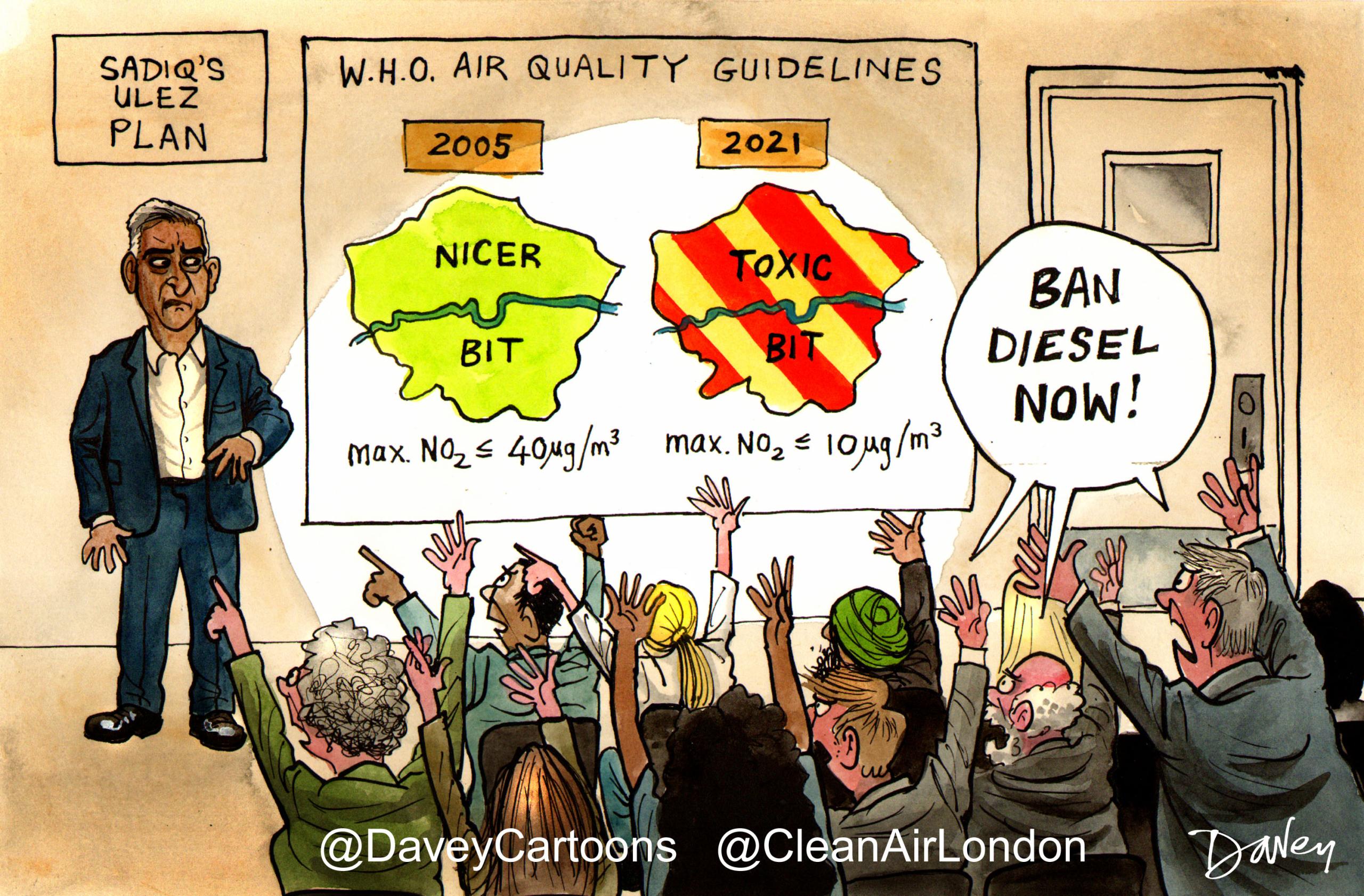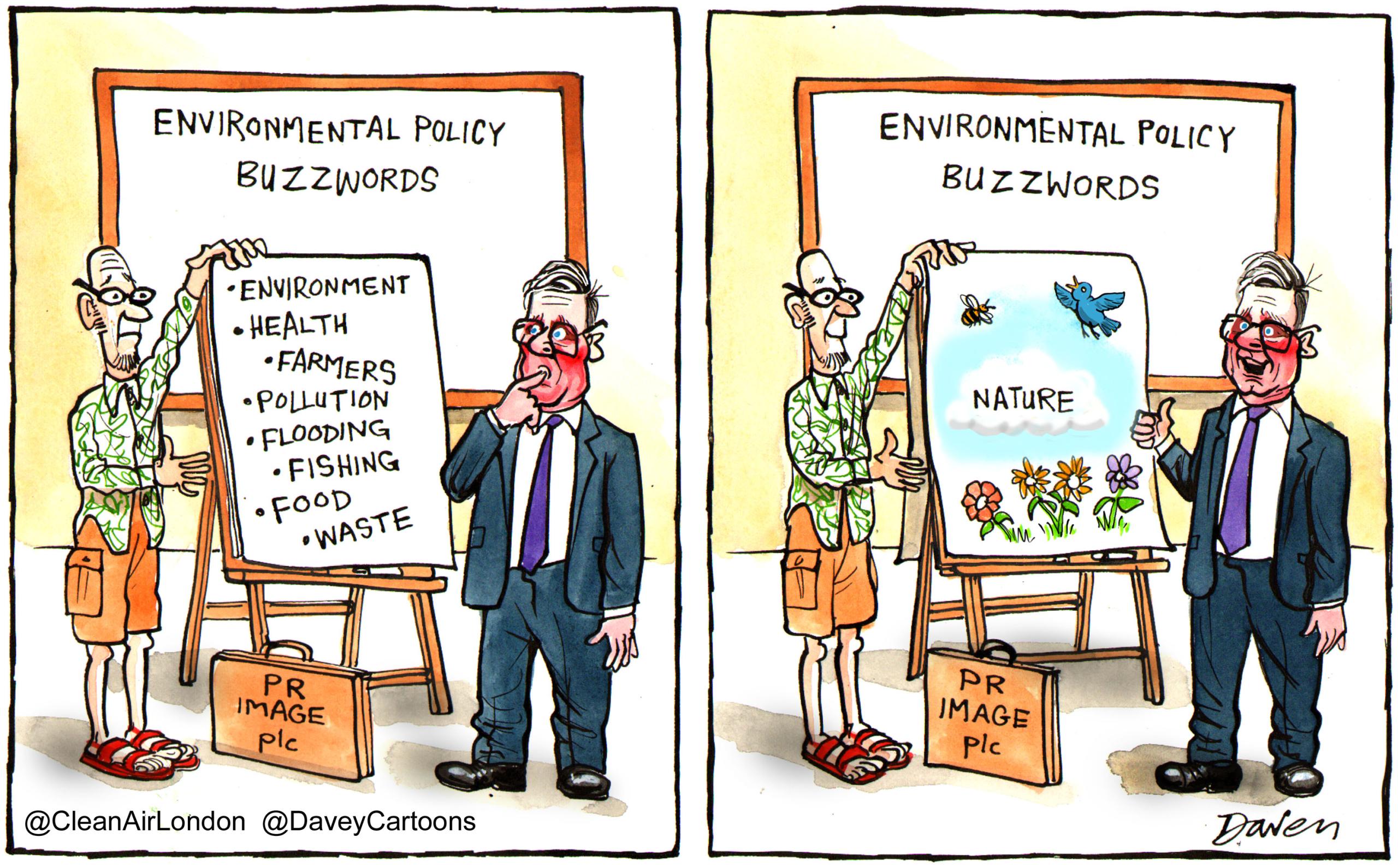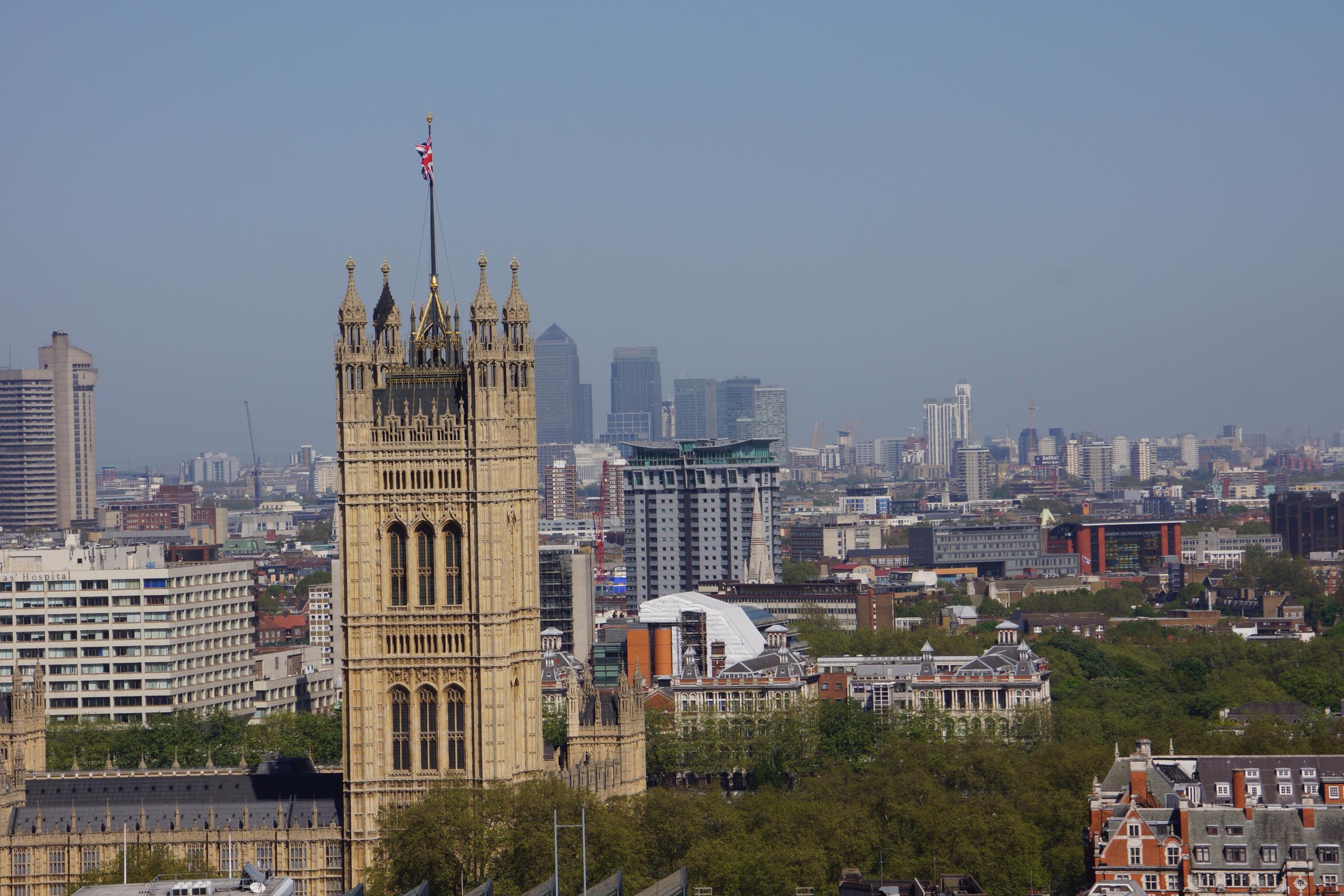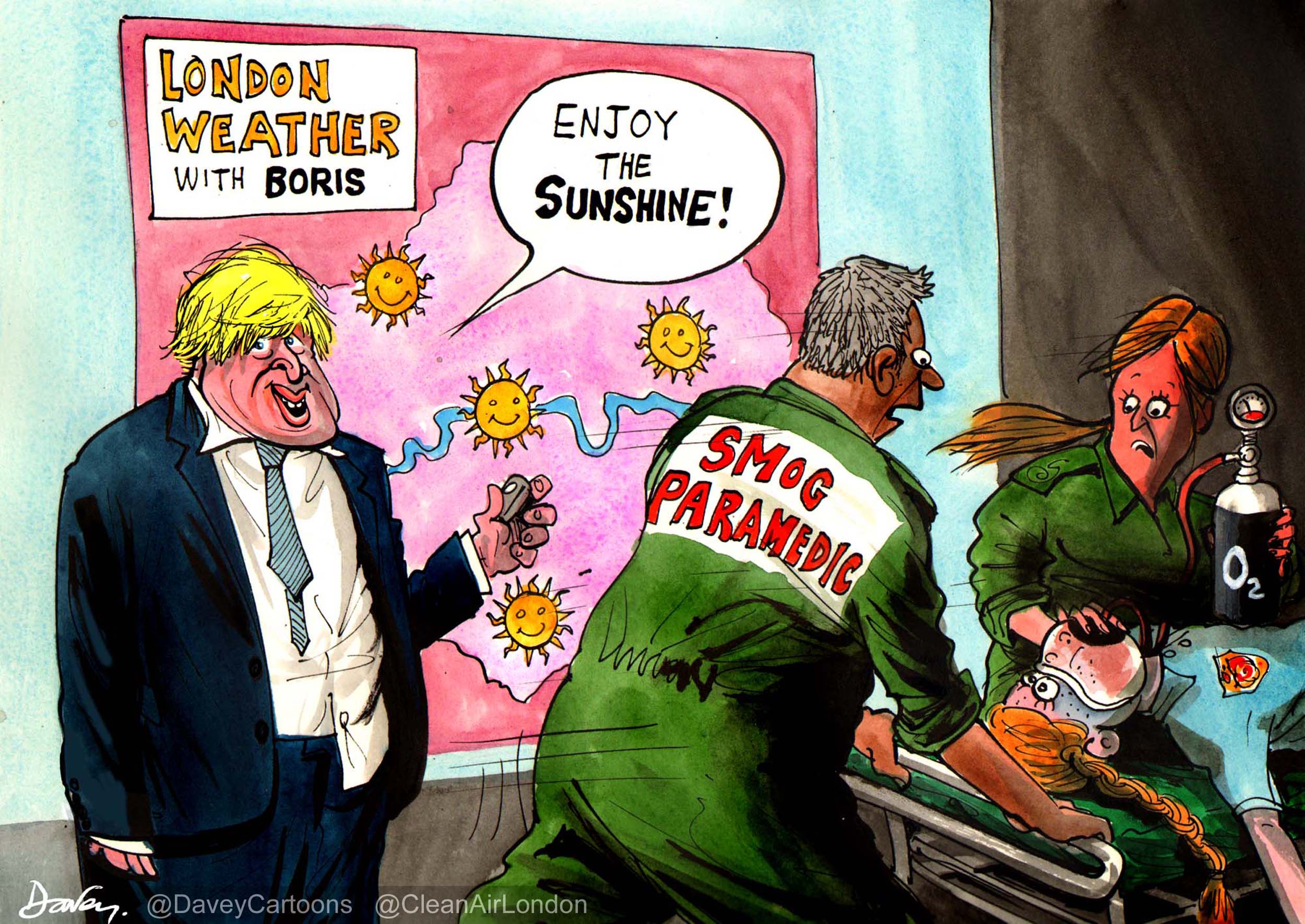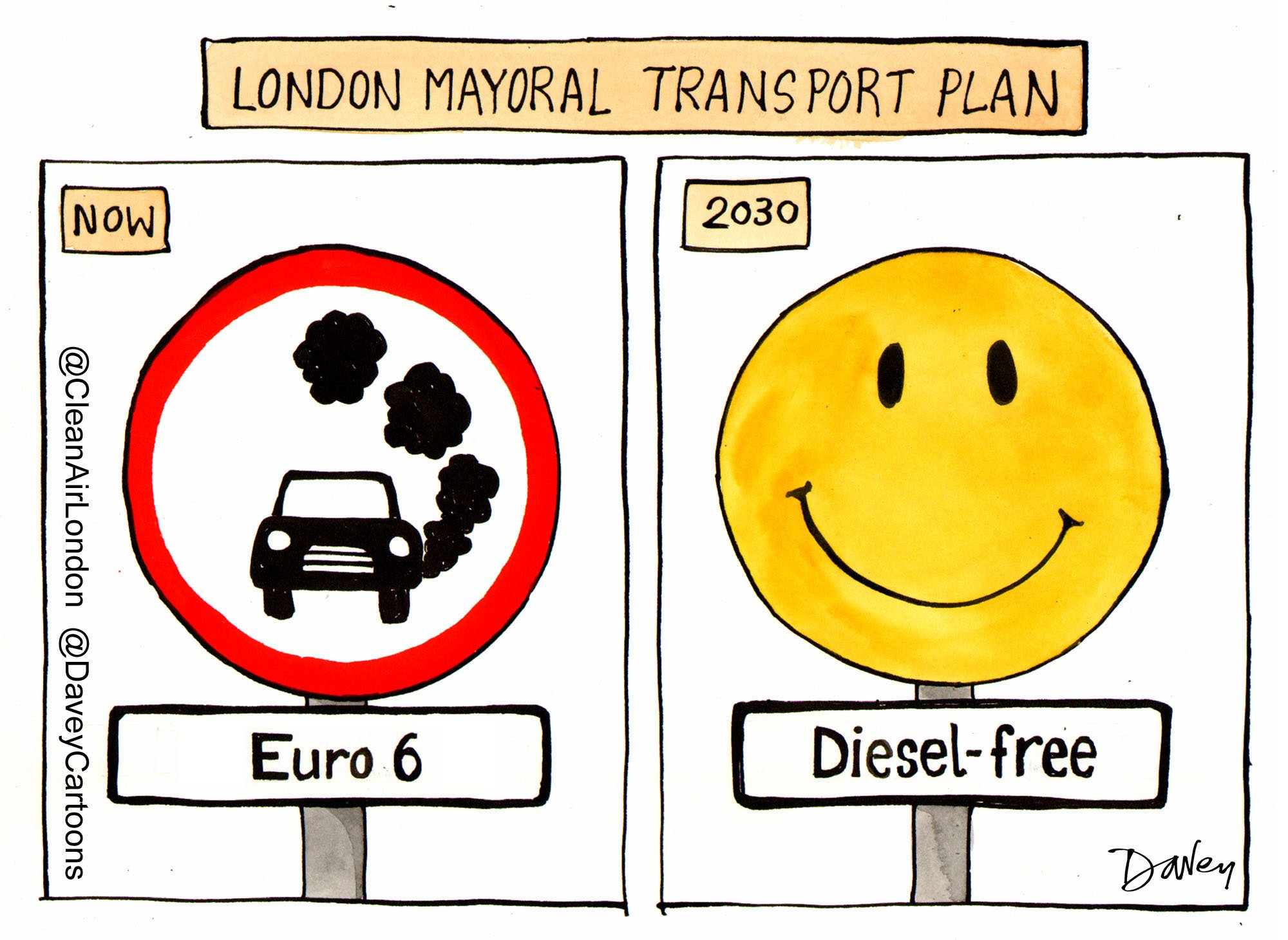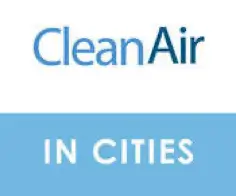‘Clean Air in London’ is joining Information Commissioner’s Office at Information Tribunal on 11 and 12 May to fight Government appeal against Order to release details including Ministerial briefings relating to its January 2009 meeting with Mayor Johnson
‘Clean Air in London’s’ excellent legal team includes barristers, Gerry Facenna and Laura Elizabeth John, and Friends of the Earth’s Rights and Justice Centre
Government has released information, in three stages, but key elements still ‘redacted’
Evidence so far suggests Government: had failed to communicate, even internally, the health impact of poor air quality in 2009 (or later); and may have mislead the European Commission in its time extension notification for PM10 and/or during infraction action
‘Clean Air in London’ has spent 15 months fighting to uncover Ministerial briefings
The Campaign for Clean Air in London (CCAL) submitted a request to the Department for Environment Food and Rural Affairs (Defra) under the Freedom of Information (FOI) Act and/or Environmental Information Regulations (EIR) on 22 January 2009. CCAL requested:
“…a copy of any minutes, papers, correspondence or other material relating directly to any meeting (including sent subsequent to it) that takes places between Lord Hunt and Mayor Johnson. I believe the meeting may include discussions about the western extension of the congestion charging zone and air quality”.
The Government is under a legal duty to respond to such requests within 20 working days. On 1 April 2009, the Government rejected CCAL’s request in full. On 1 May 2009, CCAL called for a review of the decision and this was rejected, again not within the statutory 20 working days but on 15 September 2009.
CCAL lodged a complaint with the Information Commissioner’s Office (ICO) on 3 October 2009 asking the ICO to consider the case urgently because of the public health issues involved and the fact the UK was: applying to the European Commission for a time extension to comply with European Union (EU) limit values for dangerous airborne particles (PM10); and already subject to infraction action. The ICO responded, with almost unprecedented urgency, no doubt because of the seriousness of the issues involved, and ordered Defra to release all the information requested by CCAL. Defra rejected this request and lodged an appeal against the ICO’s decision on 1 December 2009.
On 24 December 2009, Government lawyers sent (by first class post) a first tranche of information to CCAL. In response to a separate and later FOI/EIR request, the Greater London Authority (GLA) released promptly, on 11 March 2010, a copy of the letter from Lord Hunt to Mayor Johnson dated 5 February 2009 (which was one of the documents CCAL had been seeking) and the Mayor’s response to Lord Hunt dated 16 March 2009. Later the same day, the Government chose to release suddenly to CCAL the same Lord Hunt letter.
Defra released a third tranche of information on 8 April 2010, a few days after receiving CCAL’s 31 page Witness Statement which attached 37 annexes (totalling over 350 pages of evidence), which included Ministerial briefing papers and emails between senior Government officials. Key sections are blacked out (or ‘redacted’) in different documents. All these documents are being published with this Campaign Update for the first time.
A particular focus of the information released so far relates to the Government’s approach to: the Mayor’s proposed removal of the western extension of the congestion charging zone (WEZ); the Mayor’s suspension of Phase 3 of the London low emission zone (LEZ3); the process to seek time extensions to comply with EU limit values for PM10 and nitrogen dioxide (NO2); and a ‘defensive’ briefing for Ministers on the Government’s proposed expansion of Heathrow.
CCAL is keen to understand also whether the Government has acted responsibly in: seeking a time extension to comply with EU limit values for PM10 (and/or NO2); and defending the UK from infraction proceedings, launched by the European Commission on 29 January 2009, in relation to breaches since 2005 of EU limit values for PM10.
The Information Tribunal is due to hear Defra’s appeal in London on 11 and 12 May 2010. The Information Commissioner’s Office is the ‘Respondent’ and Simon Birkett, Founder of CCAL, has been joined as an ‘Additional Party’ at his request.
CCAL is advised on a pro bono basis by barristers, Gerry Facenna and Laura Elizabeth John, and Phil Michaels, Head of Legal at Friends of the Earth’s Rights and Justice Centre.
Quotes
Simon Birkett, Founder of the Campaign for Clean Air in London, said:
“The Campaign for Clean Air in London (CCAL) lodged its request for information on 22 January 2009 in a bid to uncover crucial information relating to Ministerial briefings about air quality in London ahead of a key ‘political’ meeting between Lord Hunt and Mayor Johnson.
“CCAL would never have been able to challenge the Government’s persistent stalling and refusal, over some 15 months, to release information prepared for these air quality meetings without decisive advice from Gerry and Laura and then the backing of Phil Michaels and his outstanding legal team at Friends of the Earth’s Rights and Justice Centre.
“CCAL is keen to understand, not least, whether the UK Government has acted responsibly in: seeking a time extension to comply with EU limit values for PM10 (and/or NO2); and defending the UK from infraction proceedings, launched by the European Commission on 29 January 2009, in relation to breaches since 2005 of EU limit values for PM10.
“It seems astonishing, just months after CCAL disclosed details of one of the biggest public health failings or ‘cover-ups’ by a Government in modern history and the European Commission rejected the UK’s application for an extension of time for PM10 due to ‘significant uncertainty’, that the Government is still fighting the release of information which relates directly to the same area of public health and full compliance with air quality laws.
“CCAL is determined to find out about Ministers’ understanding of and approach to: the impact on public health of poor air quality in London; the Government’s obligations under European Union (EU) laws to ensure ambient air quality; and the need for the Secretary of State to issue directions to the Mayor of London under section 363 of the Greater London Authority Act 1999 if the Mayor continues to take decisions that jeopardise the UK’s ability to achieve EU limit values in London (e.g. by removing the western extension of the congestion charging zone (WEZ) and/or delaying Phase 3 of the London low emission zone (LEZ3)).
“The third tranche of information just released by the Government (within days of receiving CCAL’s Witness Statement together with a barrage of supporting evidence), which still includes many ‘blacked out’ (or redacted) sections, provides ample evidence – in CCAL’s view – to suggest the Government: had not grasped adequately the scale or urgency of the public health threat posed by poor air quality by 2009 (or later); and may have mislead the European Commission when it submitted its time extension notification seeking a delay until 11 June 2011 to comply with EU limit values for dangerous airborne particles (PM10) and/or in defending the UK from infraction proceedings.
“A picture is emerging of a Government which: has failed to communicate the dangers of poor air quality internally within Government, never mind to the general public; is more concerned with delaying compliance with air quality laws than achieving it; and seems to want to avoid a row with the Mayor even when he is taking one or more backwards steps on key air quality measures and threatens to jeopardise the UK’s legal case for a time extension on PM10. Is there any ‘political will’ in Government to achieve full compliance with air quality laws?
“It is time the Government accepted the overwhelming public interest in favour of it releasing immediately the remaining information. It is long past time we were told the truth.”
Key issues relating to the public interest in favour of disclosure
There is a strong public interest in knowing more about Ministers’ understanding of and approach to:
1. the impact on public health of poor air quality in London;
2. the Government’s obligations under EU laws to ensure ambient air quality including, for example, the need to ensure EU legal standards for air quality (EU limit values) are not exceeded once attained and the handling of infraction action; and
3. the Secretary of State’s powers to issue directions to the Mayor of London under section 363 of the Greater London Authority Act 1999, and the need to issue such directions if the Mayor keep taking decisions that jeopardise the UK’s ability to achieve EU limit values in London (e.g. by removing the western extension of the congestion charging zone (WEZ) and/or delaying Phase 3 of the London low emission zone (LEZ3)).
Each of these issues is dealt with separately in the following sections.
Protecting public health
There is a strong public interest in knowing more about Ministers’ understanding of and approach to the impact on public health of poor air quality in London:
1. Public health failing or ‘cover-up’ by Government:
It is very odd the Government has never published an estimate for the total number of premature deaths due to long-term exposure to fine particulate matter (PM2.5). The European Commission, the European Environment Agency, the World Health Organisation and the US’s Environmental Protection Agency have all published such estimates in recent years. The Mayor has recently published an estimate of 4,300 premature deaths a year in London due to long-term exposure to PM2.5. CCAL says the Government’s failure to warn the public properly about the danger of poor air quality represents one of the biggest public health failings or ‘cover-ups’ by a Government in modern history. The Government has written to CCAL saying “there has not been a cover-up”;
2. Defra aware of CCAL concern to ‘understand’ estimates for premature deaths:
The Government was aware of CCAL’s concern to ‘understand’ estimates for the number of premature deaths in London, said for many years to be 1,031 in London in 2005 due to PM10, as early as 24 July 2008. The importance of this issue was brought again to Defra’s attention when it was copied on a letter sent by CCAL to the Secretary of State for Health on 19 April 2009 and repeatedly thereafter during 2009 and early 2010 (not least in CCAL’s letter sent to the House of Commons Environmental Audit Committee on 13 December 2009 on which Defra was copied);
3. Ministerial speech confirms inadequate health understanding in Government:
A Ministerial speech on 17 September 2009 suggests there has been inadequate understanding in Government of the public health impact of poor air quality;
4. Environmental Audit Committee says premature death estimates must be published:
The top of 10 recommendations in a report on Air Quality by the House of Commons Environmental Audit Committee (published on 22 March 2010) is “Air quality must be a higher priority for Government. Defra must raise the profile of the issue by publicising the latest data on premature deaths more widely and making clear the benefits of improving air quality”;
5. No quantification of scale of health impact of poor air quality:
It is surprising that there is no reference in any of three tranches of information so far released to CCAL to suggest Ministers were given or sought any quantification of the scale of the health impact due to poor air quality in London e.g. under ‘What is the scale of the PM10 problem in the UK?’; and
6. Evidence of inadequate understanding of health impact or need to warn the public:
In fact, on the contrary, in the email summarising the next steps to be taken after the Minister’s meeting with the Mayor, an official states: “There are a number of detailed issues the [joint Government/Greater London Authority working] group would need to explore in light of the discussions…. How best to explain to the public why air quality matters, perhaps by expressing it in more easily understandable terms such as ‘It costs you £x thousand a year extra in tax’ etc.”. References elsewhere to public health are vague and unquantified with the exception of a single reference to Mayor Livingstone’s estimates of the benefits of LEZ3: “The LEZ is expected to … over a ten year period, projections suggest that people who would otherwise die prematurely as a result of poor air quality will gain additional life expectancy totalling 5,000 years”.
It looks as though there has been limited understanding across Government of the full extent of the public health threat posed by poor air quality even after CCAL disclosed its findings last year. This is truly shocking when tens of thousands of people have been dying prematurely due to long-term exposure to dangerous airborne particles.
Was any information on premature deaths (or similar) provided to Ministers and, if so, was it correct? Did Ministers, the Mayor or senior officials request, at any time, a briefing on the scale of the impact on public health of poor air quality in London? If not, why not? Who within Government claims to have understood adequately the threat posed by poor air quality? Why have we still not been warned properly by the Government?
There is a strong public interest therefore in knowing more about Ministers’ understanding of and approach to the impact on public health of poor air quality in London.
Obligations under EU air quality laws
There is a strong public interest in knowing more about Ministers’ understanding of and approach to the Government’s obligations under EU laws to ensure ambient air quality including, for example, the need to ensure EU legal standards for air quality (EU limit values) are not exceeded once attained and the handling of infraction action:
1. Did Defra consider UK was eligible for a TEN or ‘cover-up’ an inadequate case?:
CCAL considers the UK did not meet any of three pre-conditions (and other requirements) required for the UK to obtain a time extension until 11 June 2011 to comply with PM10 limit values in London. Given the UK’s time extension was rejected by the Commission on 11 December 2009, and the UK has said it will reapply, it is as important as ever to discover whether Ministers were briefed on and understood the legal issues and planned to act responsibly to protect public health and the risk of infraction proceedings. What advice were they given? Have they ‘covered-up’ anything? Did they act for short-term political gain instead of to protect public health?;
2. PM10 time extension notification (TEN); evidence Government may have mislead European Commission over likely benefits of LEZ3
There are two references to ‘Draft/Agreed text for inclusion in consultation on time extension for PM10’ in the Ministerial briefing papers released to CCAL on 8 April 2010. The opening words in both references are: “The UK Government and the Mayor of London are committed to working together to identify further measures, to ensure the UK will meet the limit value for PM10 in 2011. These measures could include national, London and local measures as necessary”. Subsequent words are redacted in the second briefing paper.
The Technical Document Note 2 supporting the UK’s time extension notification for PM10 repeats the above wording on page v of the Executive Summary and goes on to say: “Should the Mayor decide to suspend Phase 3 [of the LEZ] the UK Government expects him to put in place other measures that would contribute to achieving the limit values to the same, if not greater, extent”. Emphasis added by CCAL. This wording matches that agreed with the GLA in an email exchange with Defra dated 9 April 2009.
Crucially however, the above wording on LEZ3 is different to that originally sought by Defra from the Mayor (disclosed to CCAL by the GLA in an email dated 7 January 2010) and that appearing in paragraph 72 on page 39 of the above mentioned Technical Document i.e. “Should the Mayor decide to suspend Phase 3 of the LEZ, we [i.e. the Government] would expect him to put in place other measures that would deliver equal, if not greater, improvements in air quality”.
LEZ3 was due to be implemented in October 2010 and protect some 15% of those worst affected by poor air quality in London.
The above analysis makes clear: first, the Mayor was unwilling to have the Government set an absolute expectation for his action to mitigate the suspension of LEZ3; and second, the Government may have mislead the European Commission on page 39 of the Technical Document about the robustness of the benefits to expect from the originally-timed LEZ3 (i.e. October 2010) which it had included in its ‘baseline’;
3. PM10 TEN; evidence Government may have mislead European Commission over Mayor’s plans to remove the WEZ:
The Technical Document supporting the TEN (published in April 2009) does not appear to include a statement, like that for LEZ3, for the WEZ. This suggests the Government may have been unable to obtain an agreement with the Mayor on measures to offset fully the removal of the WEZ and yet it planned no action to require the EU limit values to be met if the WEZ is removed. The evidence suggests: the Government did not understand fully the adverse impact on emissions that would arise if the WEZ is removed (despite trying to do so); did not inform the European Commission in the PM10 TEN that the Mayor planned to remove the WEZ (even though it was included in the Government’s ‘baseline’); and/or failed to give any reassurance even that it expected the Mayor to mitigate fully the impact of removing the WEZ if he did so. See further below;
4. EU limit values must not be exceeded once attained:
EU limit values are defined as a concentration level to be attained with a given period and not to be exceeded once attained. The Knightsbridge Association, under whose auspices CCAL operates, wrote to the Secretary of State for Environment, Food and Rural Affairs (EFRA) on 2 January 2009 explaining this obligation in detail. The evidence suggests the Government: did not fully understand the absolute nature of this legal obligation; and/or did not consider it important. The impact of removing the WEZ has been estimated by Transport for London (TfL) as likely to result in emissions of NOx and PM10 increasing by 4-8% within the area of the WEZ – which is not surprising given some 30,000 extra vehicles per day would be expected to return to the area. See further below;
5. NO2 TEN; Government postponed substantive action just months before deadline:
Substantial breaches of EU limit values for NO2 from the 1 January 2010 deadline, when the relevant standards entered into force, have long been expected but little or no action has been taken by the Government or the Mayor to meet them. It is clear from the information released on 8 April 2010 that the Government and the Mayor seem to think they can choose which public health law to comply with. See: “The [joint Defra/GLA working] group’s initial focus [from January] (to June) [2009] would be on measures required to tackle PM10, but it would also be mandated to explore related issues of NO2 in parallel where appropriate. Once we had formally communicated PM10 plans to the Commission in the summer [of 2009] then we would keep the same structure of the group but its focus would shift more firmly onto NO2”. This is a shockingly complacent and irresponsible approach to public health;
6. NO2 TEN (other); Ministers were fully briefed on negative impact of bus retrofitting:
In the context of considering the UK’s application for a time extension to comply
with NO2 limit values, the European Commission may wish to note in due course that Ministers were briefed on the negative consequences for NO2 arising from the fitting by December 2005 of particulate traps on London buses: “Although information regarding the potential increase in NO2 emissions from filters became available towards the end of the programme, TfL [Transport for London] is confident that the health benefits associated with reducing PM, CO and hydrocarbon emissions by 90% outweigh the negative impacts associated with a moderate increase in NO2”.
No specific urgent ameliorating action is mentioned or seems to have been considered necessary. Indeed, the UK sent the European Commission on 6 July 2009 details about TfL’s bus filter programme Note 2 which includes no reference to the negative impact on NO2 of the programme. These are further shocking revelations. How many more are being hidden?
The impression from information released to CCAL so far is that the Government is more interested in managing process and enquiries from the European Commission than in understanding and warning the public of the dangers of poor air quality or complying fully with air quality laws.
There is a strong public interest therefore in knowing more about Ministers’ understanding of and approach to the Government’s obligations under EU laws to ensure ambient air quality including, for example, the need to ensure EU legal standards for air quality (EU limit values) are not exceeded once attained and the handling of infraction action.
Powers and need for Government to issue directions to the Mayor
There is a strong public interest in knowing more about Ministers’ understanding of and approach to the Secretary of State’s powers to issue directions to the Mayor of London (Mayor) under section 363 of the Greater London authority Act 1999, and the need to issue such directions if the Mayor keeps taking decisions that jeopardise the UK’s ability to achieve EU limit values in London (e.g. by removing the western extension of the congestion charging zone (WEZ) and/or delaying Phase 3 of the London low emission zone (LEZ3)):
7. Government focused on keeping up appearances and avoiding a row with the Mayor:
It is clear from the information so far released to CCAL that the Government and the Mayor wished to: maintain the appearance in public of a good working relationship in an effort to obtain a time extension to comply with EU limit values for PM10; and avoid a row e.g. “we should play it straight”. The underlying reality seems quite different;
8. Meaningful differences; LEZ3:
This Campaign Update has referred earlier to material differences between the Government and the Mayor in relation to LEZ3 and the possibility that the Government may have mislead the European Commission;
9. Meaningful differences; WEZ:
From the information released to CCAL so far, differences between the Government and the Mayor seem greatest in relation to the WEZ. The Government appears to realise the removal of the WEZ would have some adverse impact on air quality, although the extent was under-estimated by Defra officials. Indeed the Minister is reported to have written to Mayor Johnson on 15 October 2008 “urging him to ‘keep the air quality gains the congestion charge and other initiatives have delivered’. We had asked officials to arrange a meeting between yourself and Boris Johnson to discuss wider air quality issues in London before the Western Extension announcement was made. However, the announcement was made without warning to many GLA officials, with speculation a leak had forced this”. The following paragraph in the Ministerial briefing paper, which may have referred, for example, to a reply from the Mayor, has been redacted.
It is clear Defra sought to understand the adverse impact on emissions likely to arise as a result of the proposed removal of the WEZ. In this context, The Knightsbridge Association had written to the Secretary of State for EFRA on 3 January 2009 highlighting that the SOS would be in breach of his statutory duty to ensure EU limit values are not exceeded once attained if Mayor Johnson removes the WEZ without simultaneously and completely offsetting the air quality impacts of doing so.
However, Defra under-estimated the numbers and concluded that “whilst scrapping the western extension to the congestion charge would impact on PM10, in itself this wouldn’t constitute a massive backward step”. Defra noted on 23 January 2009 that “As far as the western extension to the congestion charging zone is concerned, the GLA felt that the environmental/air quality benefits this had delivered were relatively trivial and that other measures would be much more effective”.
Let’s remember that the latest draft of the Mayor’s Air Quality Strategy expects to deliver no more than a 13% and a 33% reduction in PM10 emissions from all sources in central London between 2008 and 2011 and 2015 respectively. In this context, even ignoring the health impact and the need to ensure EU limit values are not exceeded once attained, the WEZ is a crucial measure to reduce harmful emissions.
It seems: the Government did not appreciate the full impact on emissions (of 4-8% on each of PM10 and oxides of nitrogen) that would arise if the WEZ is removed; and the Mayor and GLA did not enlighten it. Further, the Government does not seem to have understood fully that no adverse impact on air quality is allowed once limit values are met. Bear in mind too that it would be the Secretary of State who would be in breach of his statutory duties if the Mayor removed the WEZ without fully and simultaneously offsetting any adverse impacts on air quality;
10. Meaningful differences; Heathrow expansion:
Lord Hunt is reported to have asked for a ‘defensive’ briefing on Heathrow. The Government considered Heathrow a “red herring as the PM10 and NO2 problems were much worse in central London, so that’s where our joint focus should be”; and
11. Further evidence of failure to co-ordinate action and work together:
The suspension of LEZ3 on 2 February 2009, just 10 days after Defra wrote “The GLA did confirm that they were committed to the LEZ as it currently stood” and six days and four days after Defra’s lodged its PM10 TEN and the launch of infraction proceedings respectively, seems – at a minimum – to have surprised Defra. A pattern does emerge though, when considered with the WEZ actions above, that Mayor Johnson was making little or no effort to support proactively the Government’s efforts to seek a time extension to comply with the PM10 limit values. Similarly, the Mayor may have concluded similarly in respect of the Government’s planned expansion of Heathrow.
It seems that the Government and the Mayor have put greater emphasis on: each pursuing their own policies (e.g. the Government’s planned expansion of Heathrow and the Mayor’s planned removal of the WEZ and the suspension of LEZ3); and avoiding a public row, than on working actively together to deliver urgent improvements in public health in London. The public face of working together seems no more than a cynical ploy to make it easier to obtain a time extension to comply with EU limit values and avoid the sort of scrutiny that is now taking place.
There is a strong public interest therefore in knowing more about Ministers’ understanding of and approach to the Secretary of State’s powers to issue directions to the Mayor of London under section 363 of the Greater London Authority Act 1999, and the need to issue such directions if the Mayor keeps taking decisions that jeopardise the UK’s ability to achieve EU limit values in London (e.g. by removing the western extension of the congestion charging zone (WEZ) and/or delaying Phase 3 of the London low emission zone (LEZ3)).
Next steps
Defra’s appeal to the First-Tier Tribunal (Information Rights) is due to be heard on 11 and 12 May 2010 in London. CCAL has offered to give oral evidence. Defra is the Appellant, the Information Commissioner’s Office is the 1st Respondent and Simon Birkett, Founder of CCAL, is the 2nd Respondent.
Notes:
12. Timeline of key events relating to CCAL’s FOI/EIR request
2009
- 22 January: CCAL submits FOI/EIR request about air quality meetings to Defra
- 1 April: Defra rejected CCAL’s request in full;
- 1 May: CCAL requested Defra review its decision;
- 15 September: Defra rejected CCAL’s request in full;
- 3 October: CCAL requested the Information Commissioner’s Office (ICO) urgently review Defra’s refusal to provide the information requested;
- 2 November: ICO ordered Defra to release all the information requested by CCAL;
- 1 December: Defra appeals against ICO’s decision;
- 24 December: Defra sends some information to Friends of the Earth for CCAL
2010
- 11 March: in response to a separate FOI/EIR request GLA released to CCAL copies of Lord Hunt’s letter to Mayor Johnson dated 5 February 2009 and the Mayor’s reply dated 16 March 2009. Later the same day Defra suddenly released the Lord Hunt letter to CCAL saying “the public interest in withholding this information no longer outweighs the public interest in disclosing it”;
- 8 April: Defra emails further information to FOE for CCAL (three days after CCAL had submitted its Witness Statement) including Ministerial briefing papers, emails and other information. Several sections are redacted; and
- 11 and 12 May: Information Tribunal is due to hear Defra’s appeal.
13. UK notification to the European Commission seeking a time extension to comply with EU limit values for PM10.
The Time Extension Notification Forms and Accompanying Technical Document appear as links.
See also ‘Evidence of the programme for fitting particulate filters to London buses’. Please note: this text was taken by Defra from the Transport for London website for submission to the European Commission on 6 July 2009.

